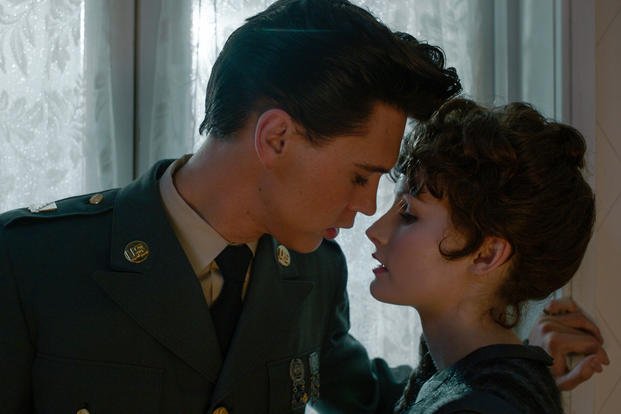The story of how Army veteran Elvis Presley came to dominate 20th-century culture is made up of thousands of memorable incidents, and director Baz Luhrmann had to leave out a lot of great moments to squeeze everything into just 2 hours, 40 minutes. He made a movie that's loud, brash and gloriously tacky, with the aim of teaching younger generations about the King.
You can't tell the story of Elvis without focusing on his love story with Priscilla and you can't relate that love story without revealing the fact that the future husband and wife met in Germany when Elvis was serving in the Army and Priscilla was just 14 years old.
With that fact understood, just how much of Elvis Presley's Army service do we get in "Elvis"?
First, let's note that Austin Butler's performance as Elvis is spectacular. Young folks know Butler from a series of roles in shows like "Zoey 101," "Switched at Birth," "The Carrie Diaries" and "The Shannara Chronicles." If you've never heard of those shows, you were too old to care about them when they aired.
Butler had his adult acting breakthrough as Manson family member Tex Watson in Quentin Tarantino's 2019 "Once Upon a Time...In Hollywood" when he gets wasted by Brad Pitt, in Pitt's Oscar-winning performance as World War II hero and stuntman Cliff Booth. Butler's next big role will be as Maj. Gale Cleven in the Apple TV+ series "Masters of the Air," a WWII drama from the same team that made "Band of Brothers" and "The Pacific."
Back to "Elvis." Tom Hanks gives a mystifying performance as Col. Tom Parker, Presley's manager and the villain of this particular movie. Parker (not his real name) was an illegal Dutch immigrant who built a career as a carnival showman before taking on the country singer Hank Snow and then Presley. Parker was an honorary colonel in the Louisiana State Militia, an honor bestowed by Gov. Jimmie Davis, the man who wrote "You Are My Sunshine."
Hanks wears a latex fat suit and employs one of his mystifying accents, equally bizarre as the ones he employed in "The Terminal" and "The Ladykillers." This time, he's trying to start with something Dutch and layer on a Southern drawl. It's just plain weird and impossible to avoid, because the movie is almost equal parts Presley and Parker.
This is important because all of Presley's weird career decisions are directly related to the fact that Parker cannot leave the country, because he might not ever be able to return, and due to the unfortunate pressures created by the Colonel's degenerate gambling and constant need for cash.
In this movie version of Presley's life, Parker sees the showmanship but never understands Elvis' music. When the singer's combination of country and rhythm-and-blues music caused a moral panic among old people, the manager wanted him to tone down his act, but Presley just had to answer the call of his muse.
The movie makes a big deal out of a July 4, 1956, show at Russwood Park in Memphis, Tennessee, when Presley was supposed to stand still on stage and introduce a new "adult-friendly" Elvis. The kid rocks out, and the cops shut down the show.
What does that have to do with the Army? The movie version suggests that Col. Tom saw the boy's career slipping away and figured that a couple of years in the Army would calm down the critics and convince the public that Elvis was an all-American boy. So, at a time when getting out of military service wouldn't have posed a challenge, the biggest singer in America accepted his draft notice and joined the Army.

We never see Elvis struggling through basic training, nor do we see him performing any Army duties during his service in Germany in 1959. The movie does offer an extended romantic scene when the polite and shy young Army private, who's wearing his dress uniform, makes an emotional connection with young Priscilla Beaulieu, the 14-year-old daughter of an Air Force officer stationed in Germany.
Soon, Elvis is out of the Army and back home making movies. We see Elvis and Priscilla marry in 1967, and their love story, daughter Lisa Marie and subsequent divorce are the focus for the rest of the movie, to the point where the King's later romances with Linda Thompson and Ginger Alden are missing.
Does "Elvis" give short shrift to Presley's Army career? It's hard to say that Pvt. Presley doesn't get enough screen time when so many other famous moments from Elvis' life didn't fit into the movie. There's nothing about his legendary visit to President Richard Nixon at the White House, nothing about the King's obsession with karate and racquetball, nothing about movies like "Viva Las Vegas" or "Jailhouse Rock."
There's probably a television series or at least a movie to be made about Pvt. Presley's Army days. It's a fascinating story about how the most famous young man in America managed to blend in with his fellow soldiers and make a good impression on both the brass and the folks back home.
For now, we've got "Elvis," a deliriously over-the-top celebration of the singer's impact on the culture. It's far less serious than John Carpenter's 1979 TV movie with Kurt Russell in the title role. Butler's a great Elvis, and Hanks is totally comfortable with his odd acting choices as Parker. It's a great ride if you can go with the spirit of the movie.
Keep Up With the Best in Military Entertainment
Whether you're looking for news and entertainment, thinking of joining the military or keeping up with military life and benefits, Military.com has you covered. Subscribe to the Military.com newsletter to have military news, updates and resources delivered straight to your inbox.
















